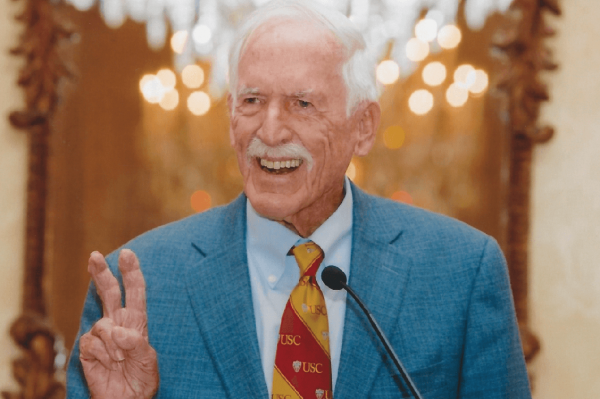Sparking Innovation
As he has done his whole engineering life, Ken Richardson, M.S. ’54, sees problems and wants to find solutions.

In his richly detailed new book, “Sparking Innovation: Lessons to Spur America to Regain Its Lead in Science and Engineering,” the former president of Hughes Aircraft makes his case for reversing the country’s fading relationship with the science and technology sector.
According to Richardson, the United States has been moving in the wrong direction for some time. In the last century, the U.S. was first among nations in technological innovation. That provided a strong foundation for a booming economy and the emergence of countless improvements in our quality of life. Now, however, we face significant problems in education, research and development, job participation, and overall interest in math and science from every demographic region. America is now ranked fourth overall in technological innovation, 41st in education, and 85th in the percentage of graduates in science, technology, engineering and math (STEM) fields.
Although the worry is genuine and the data is real, Richardson believes these challenges can be successfully addressed because of America’s innate zeal to respond to threatening problems.
“Citizens of the U.S. should be very concerned about our nation falling behind many other countries as sources of advancement in virtually all technologies,” he said. “Unfortunately, many of the technical graduates in U.S. universities are from other countries and they return home to apply their skills to benefit our competitors.”
Richardson should know. He earned three degrees in engineering and business administration — from Tufts University and UCLA as well as USC. He also held several leadership positions during his 40 years at Hughes Aircraft throughout its “golden era,” when it was the world’s leading aerospace corporation for military electronics and satellite development and production.
Recently, other positions have become more important to him: author, elder statesman and messenger. Richardson has seen and done enough to know that the United States is having trouble when it comes to producing and cultivating science and technology leadership. And he feels compelled to spread the word.
Thus, “Sparking Innovation.”
“For the last few years, many of us old-timers have been concerned,” he said. “I am consistently asking myself, ‘What should be done to get back on top?’ I wanted my personal history to set a standard.”
“Sparking Innovation” explores the motivations and inspirations of those who conceived many familiar devices that benefit human lifestyle, describes management strategies for nurturing continual creativity, and highlights successful leadership philosophies of several past and recent innovative companies. USC Viterbi Dean Yannis C. Yortsos adds his view of the future in the book’s foreword.
“It starts with kids,” Richardson said. “They have to get interested in the beginning. That isn’t happening. They are inspired to do something for themselves but not technology. We need inspirational movement at the lowest level of schooling.
“It is absolutely a matter of quantity,” he added. “We have the quality — USC Viterbi is a perfect example. From that standpoint, America is absolutely superb. But we need to persuade the population to place a priority on science and engineering, increase resources devoted to education, enhance the achievement standards in our schools, and multiply investment in research and development.”
Indeed, the grip on R&D, once America’s strength, has loosened considerably, he said, opening the door for skilled competition.
“China is investing twice as much per year on research and development as the U.S.,” he said. “It is also alarming that their focus is on development rather than research, often using inventions stemming from U.S. investments. This gives them a competitive edge.”
A byproduct of China’s and other countries’ vast improvement and competitive drive should, according to Richardson, make all technologists that much more committed and passionate about wanting to be the best.
“The drive for competitive survival breeds enthusiastic staff motivation, increases productivity and fosters free-thinking teamwork searching for technology breakouts,” he said.
Despite the industry’s reliance on standards and regulations, one of the most important ways America can get back on top is to let its science and technology experts have the freedom to dream big and build bigger.
“A meaningful key to success is fostering open minds not encumbered by rigorous procedures,” Richardson said. “Hughes did this well, aptly describing its staff as ‘a large bunch of anarchists bonded only by a common parking lot.’ ”
“Sparking Innovation” is available at richardsonbook.com.



